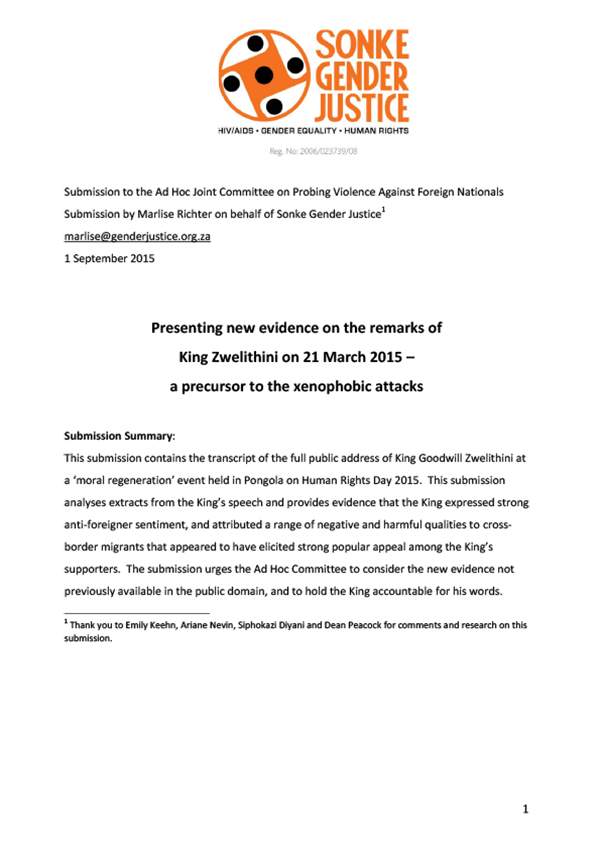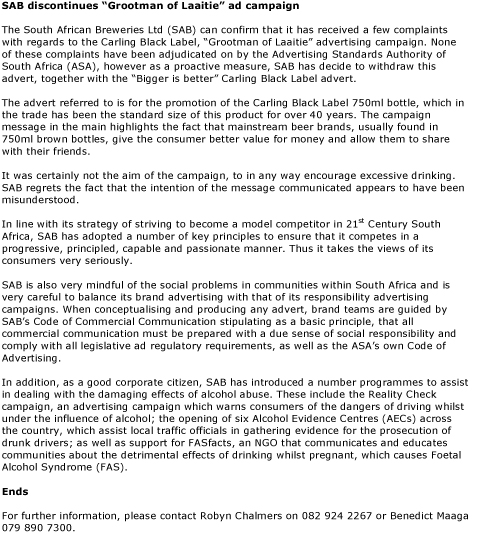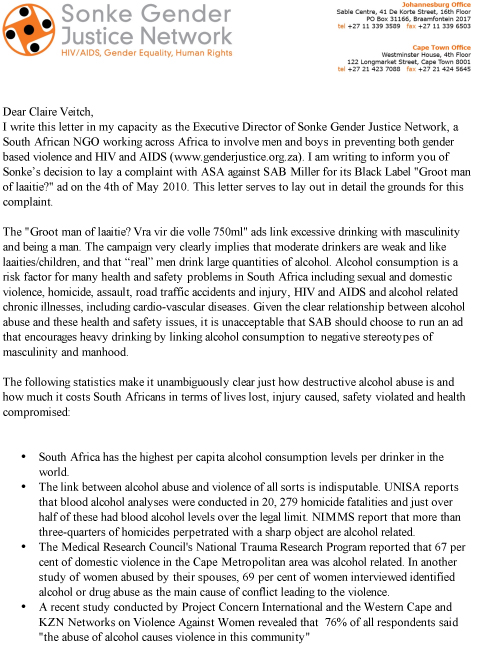This submission contains the transcript of the full public address of King Goodwill Zwelithini at a ‘moral regeneration’ event held in Pongola on Human Rights Day 2015. This submission analyses extracts from the King’s speech and provides evidence that the King expressed strong anti-foreigner sentiment, and attributed a range of negative and harmful qualities to cross-border migrants that appeared to have elicited strong popular appeal among the King’s supporters. The submission urges the Ad Hoc Committee to consider the new evidence not previously available in the public domain, and to hold the King accountable for his words.
Publication Type: Parliamentary & Other Submissions
-
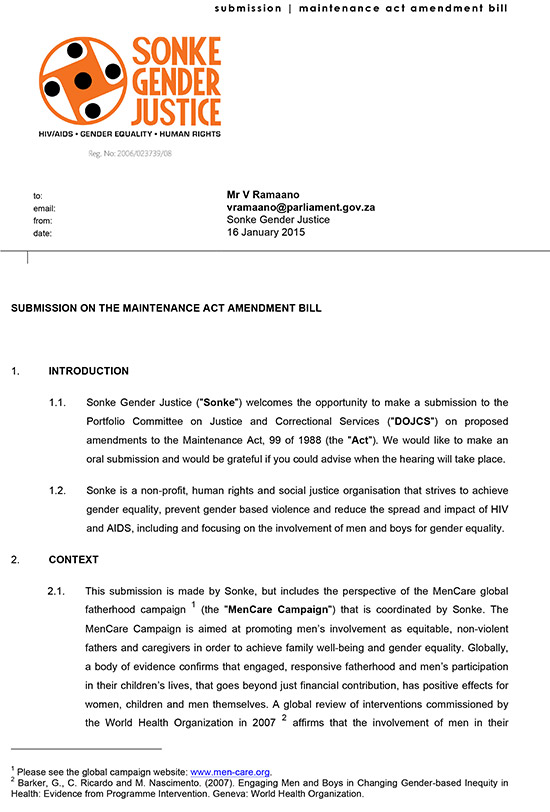
Submission on the Maintenance Act Amendment Bill
This submission is made by Sonke, but includes the perspective of the MenCare global fatherhood campaign (the “MenCare Campaign”) that is coordinated by Sonke. Sonke endorses the Bill, but has made some comments and recommendations that are featured in this submission.
-
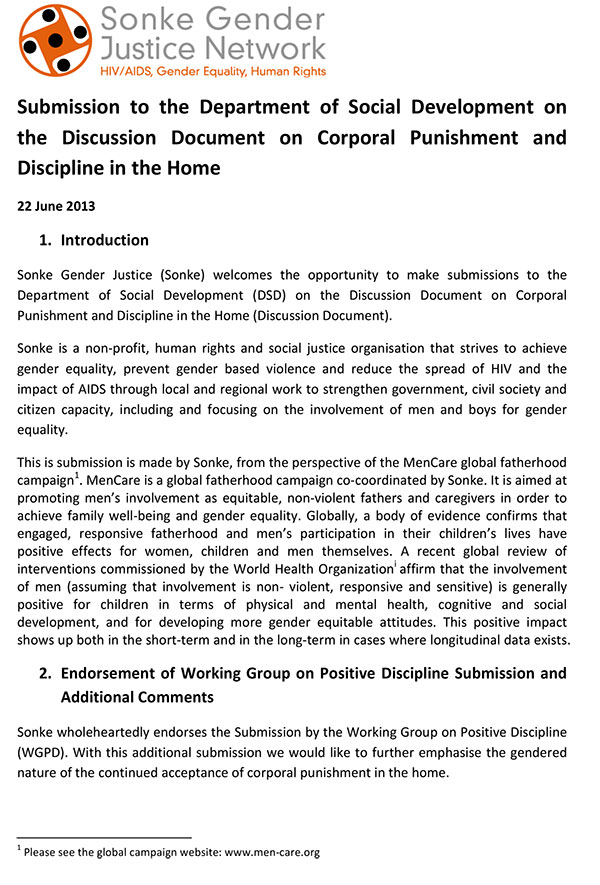
Submission to the Department of Social Development on the Discussion Document on Corporal Punishment and Discipline in the Home
Sonke Gender Justice (Sonke) welcomes the opportunity to make submissions to the Department of Social Development (DSD) on the Discussion Document on Corporal Punishment and Discipline in the Home (Discussion Document).
Sonke is a non-profit, human rights and social justice organisation that strives to achieve gender equality, prevent gender based violence and reduce the spread of HIV and the impact of AIDS through local and regional work to strengthen government, civil society and citizen capacity, including and focusing on the involvement of men and boys for gender equality.
This is submission is made by Sonke, from the perspective of the MenCare global fatherhood campaign. MenCare is a global fatherhood campaign co-coordinated by Sonke. It is aimed at promoting men’s involvement as equitable, non-violent fathers and caregivers in order to achieve family well-being and gender equality. Globally, a body of evidence confirms that engaged, responsive fatherhood and men’s participation in their children’s lives have positive effects for women, children and men themselves. A recent global review of interventions commissioned by the World Health Organization affirm that the involvement of men (assuming that involvement is non- violent, responsive and sensitive) is generally positive for children in terms of physical and mental health, cognitive and social development, and for developing more gender equitable attitudes. This positive impact shows up both in the short-term and in the long-term in cases where longitudinal data exists.
-

Submission to the Civilian Secretariat for Police on the Green Paper on Policing
This submission is made by several gender, women’s rights and children’s rights civil society organisations working in the area of gender based violence. Some of these organisations provide direct services to survivors of domestic violence through shelters or psycho-social and legal advice or support and others conduct advocacy and litigation around women’s and children’s rights to equality and freedom from violence.
Following a civil society workshop on domestic violence organised by the Community Law Centre of the University of the Western Cape on 22 July 2013, the participating organisations decided to make submissions on the Civilian Secretariat of Police’s (‘the Secretariat’) Green Paper on Policing published in the Government Gazette on 18 June 2013 (‘the Green Paper’). This decision was made in light of the fact that part of the poor implementation of the Domestic Violence Act 116 of 1998 (‘the DVA’) which impedes survivor’s of domestic violence ability to benefit from the DVA is linked to problems with policing. Additionally, certain provisions in the DVA that places duties on the South African Police Service (‘SAPS’) needs to be amended to improve policing. Accordingly, this submission only contains comments and recommendations applicable to domestic violence and policing.
-
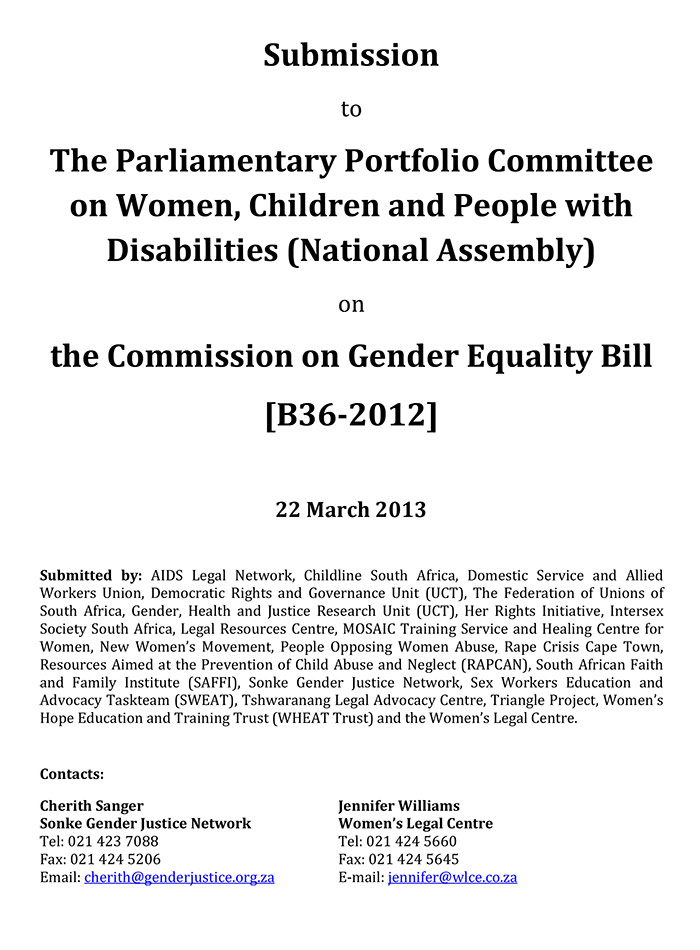
Submission to The Parliamentary Portfolio Committee on Women, Children and People with Disabilities (National Assembly) on the Commission on Gender Equality Bill
The organisations making these submissions welcome the opportunity to provide submissions to the Portfolio Committee on Women, Children and People with Disabilities (‘the Portfolio Committee’) on the Commission for Gender Equality Amendment Bill: B36-2012 (‘the Bill’).
This submission is submitted by a collective of organisations (hereinafter referred to as ‘the organisations’ or ‘we’) working towards the advancement and enforcement of women’s human rights through the provision of direct services, public education, capacity building, law and policy reform, and various forms of advocacy. A full list of the organisations is provided on the covering page of this submission.
All of the organisations have an interest in a Commission for Gender Equality (‘CGE’) that is proactive, effective and successful and that has the necessary independence and authority to optimally fulfil its mandate to advance gender equality in South Africa – more particularly, women’s human rights and well-being.
The organisations support those objectives of the Bill that are technical in nature and that seek to bring the Commission for Gender Equality Act of 1996 (‘CGEA’) in line with the Constitution Act of 1996 (‘the Constitution’). We recognise that the CGEA was enacted while the interim Constitution of 1993 was in operation and prior to the coming into operation of the final Constitution, the result of which was that the CGEA necessarily makes reference to the repealed interim Constitution. In this submission, we make recommendations to further enhance the effectiveness of the CGE and strengthen its independence in accordance with the constitutional imperatives of Chapter 9 institutions.
In this submission, we raise concerns about specific proposed amendments which may undermine the independence of the CGE and motivate for further amendments to the CGEA.
-
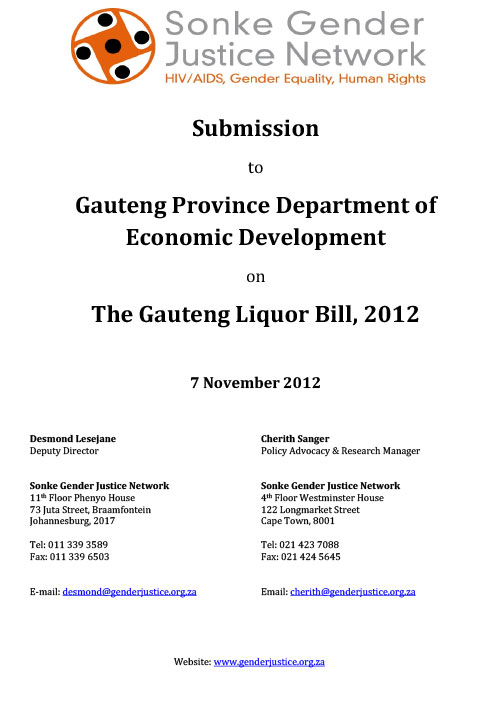
Submission to Gauteng Province Department of Economic Development on The Gauteng Liquor Bill, 2012
Sonke’s interest in the Bill is linked to its mission to prevent gender-based violence (GBV) on the basis that we are of the view that alcohol consumption facilitates and exacerbates GBV. This submission explores the intersection between alcohol consumption and GBV and provides comments and recommendations put forth by Sonke on the Bill.
-
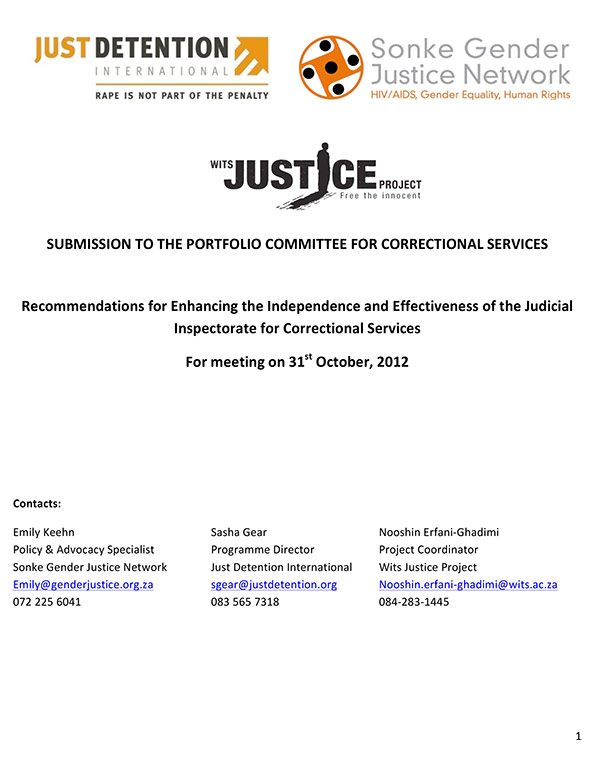
Recommendations for Enhancing the Independence and Effectiveness of the Judicial Inspectorate for Correctional Services
The Judicial Inspectorate of Correctional Services (JICS) is a vital watchdog body that oversees South Africa’s correctional system, and is mandated to inspect and report on the treatment of inmates. To be an effective independent oversight mechanism for a correctional system that is mired with challenges, JICS requires strong institutional independence as well as support and cooperation from other departments such as the Department of Correctional Services (DCS), National Prosecuting Authority (NPA), and the South African Police Service (SAPS). Just Detention International (JDI), Sonke Gender Justice Network (Sonke), and the Wits Justice Project (WJP) are concerned that JICS lacks adequate independence (including operational, financial and perceived independence) from DCS, and it is not sufficiently empowered to carry out its mandate to help protect inmates’ human rights. While the full submission outlines a number of important challenges facing JICS, our key recommendations are summarised here.
-
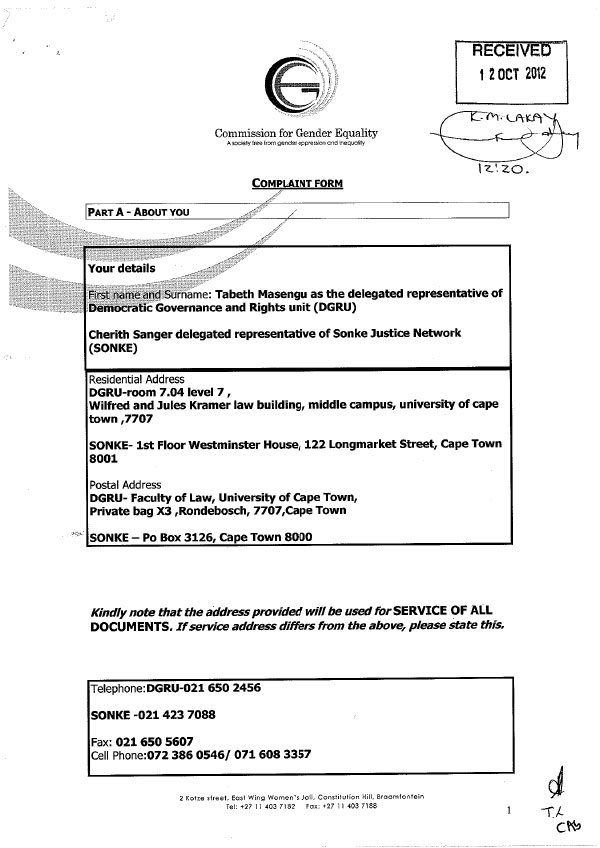
Complaint form filed to the Commission of Gender Equality
Section 174(2) of the South African Constitution require that appointments to the judiciary reflect broadly the racial and gender composition of South Africa.
However we have observed that the judiciary does not mirror a gender composition that is reflective of society.
-
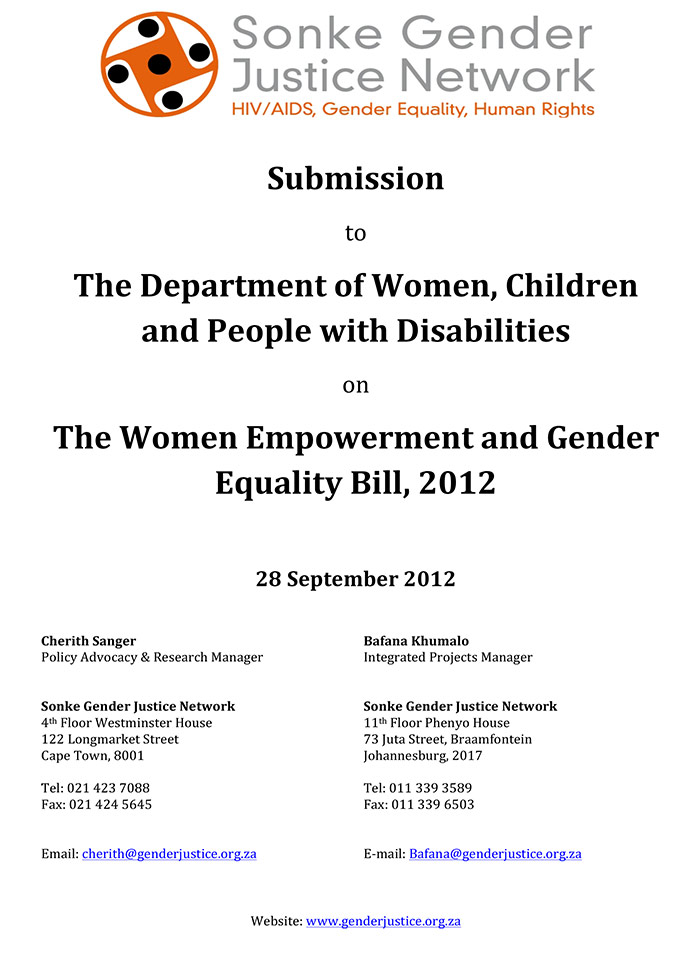
Submission to The Department of Women, Children and People with Disabilities on The Women Empowerment and Gender Equality Bill, 2012
Sonke’s interest in the Bill is based on its core mission to attain gender equality. The law is a fundamental avenue through which women’s and gender non-conforming persons’ human rights can be advanced to the extent that the law is shaped by needs of society and in turn shapes social and cultural norms. The Bill can specifically fill the existing gaps in law and policy to address unfair gender discrimination.
Sonke supports the general purpose and objectives of the Bill. However, the Bill falls short in several areas. Among other issues, it does not adequately deal with the following: addressing the root causes of gender inequality, providing adequate measures for the implementation of the Bill, recognising multiple grounds of discrimination, and failing to categorise unfair discrimination against lesbian, gay, transgender, and intersex (‘LGBTI’) persons as a form of unfair gender discrimination. Lastly, its proposed accountability mechanism potentially duplicates the role and powers assigned to the Commission for Gender Equality (‘CGE’).
-
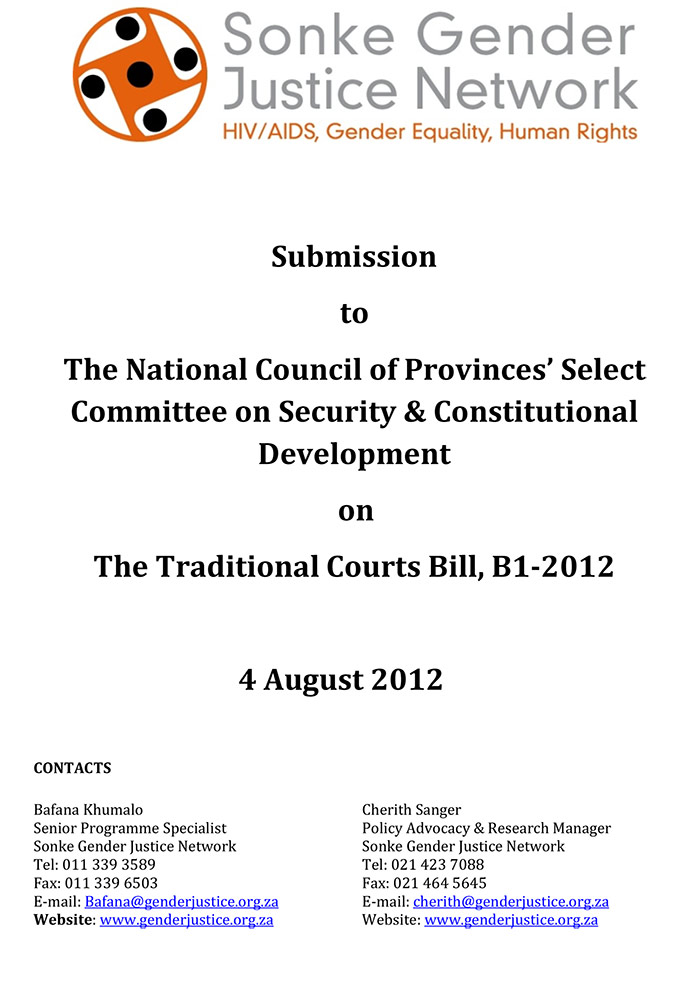
Submission to The National Council of Provinces’ Select Committee on Security & Constitutional Development on The Traditional Courts Bill
We make these submissions to the Select Committee on Security and Constitutional Development (‘the Committee’) in the interest of public participation and in an effort to advance the constitutional imperatives to human dignity, equality and freedom for all South African citizens.
Our ultimate view is that the Traditional Courts Bill (‘the Bill’) should be rejected and withdrawn in its entirety due to its unconstitutionality, substantively, and its procedural defectiveness.
Our reasons for opposing the Bill are based on the fact that several of the provisions of the Bill are unconstitutional and undermine women’s constitutional rights to equality on the basis of gender. We are further of the view that the procedures preceding the drafting of the Bill, which excluded consultations with women from traditional communities, indicates that the Bill does not reflect the needs and wants of majority of the population and undermines the values of the Constitution Act 108 of 1996 (‘the Constitution’).
-
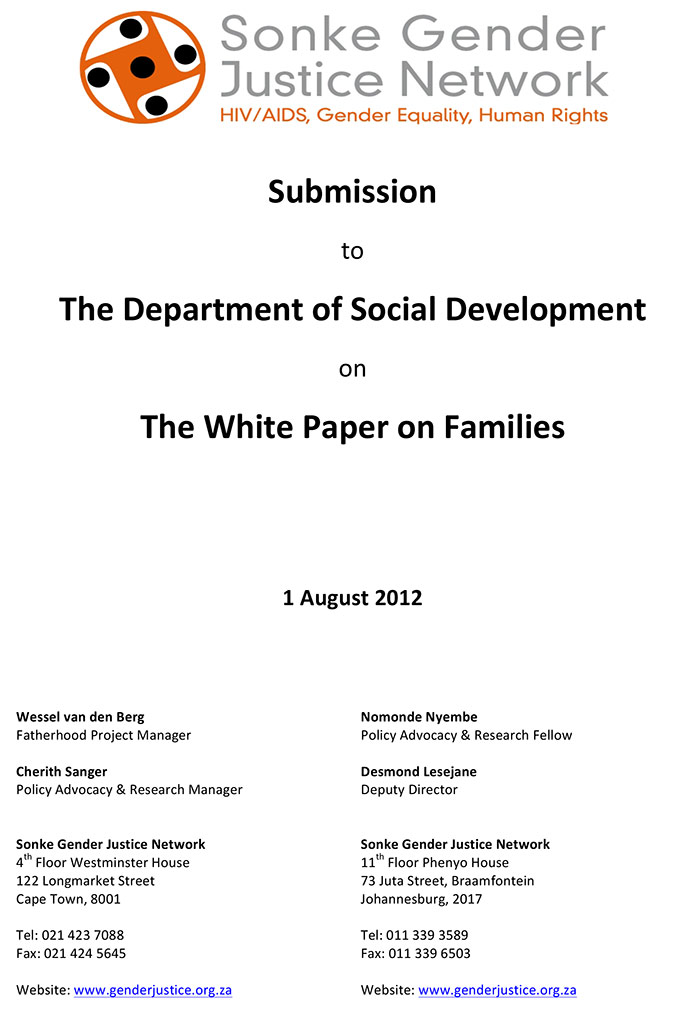
Submission to The Department of Social Development on The White Paper on Families
Sonke’s interest in the White Paper is based on the work that it does to encourage and support gender equitable and non-violent parenting. In shifting societal norms through the law men can contribute to the development of a gender equitable care economy which would ultimately valuably contribute to the attainment of gender transformation in South Africa.
-
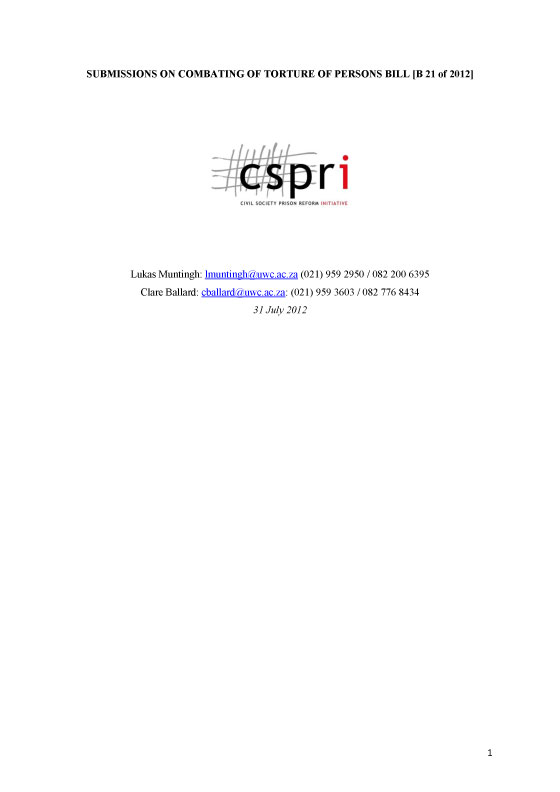
Submissions on Combating of Torture of Persons Bill
These submissions represent the views of a group of organisations. We welcome the tabling in Parliament of the Combating of Torture of Persons Bill as it represents an important step in preventing and eradicating torture and other ill treatment in South Africa, demonstrating the state’s commitment to fulfil its obligations under international human rights law and the Constitution.
These submissions address, primarily, whether the contents of the Bill comply fully with the obligations imposed on the state in terms of international law. Accordingly, its contents will be examined against the requirements of the UN Convention against Torture and Other Cruel, Inhuman or Degrading Treatment or Punishment (UNCAT). These submissions also include recommendations on what the Bill should include and/or exclude as well as suggestions on how the text could be amended.
It is the view of the organisations party to this submission that the Bill should aspire to establish a legislative framework that is as comprehensive as possible to facilitate South Africa’s compliance with duties under UNCAT.
-
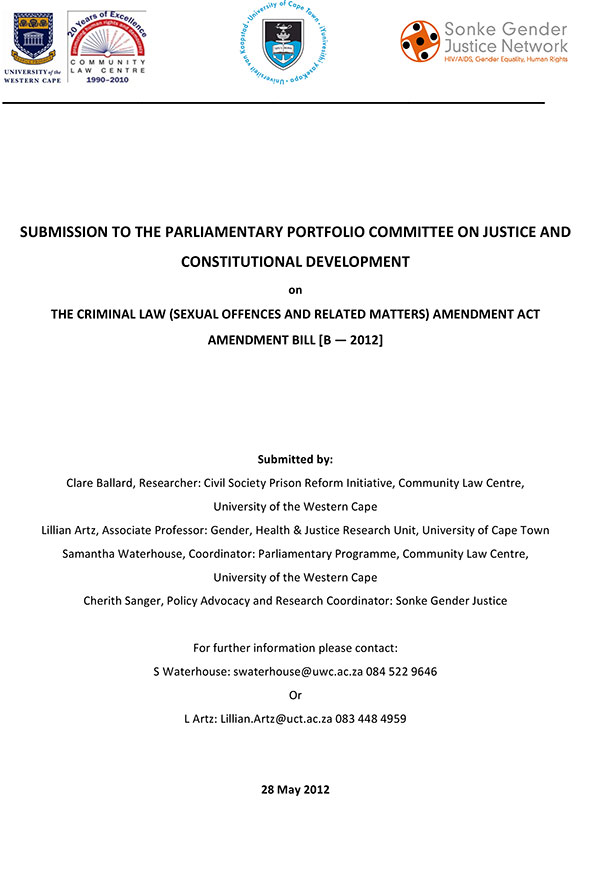
Submission to the Parliamentary Portfolio Committee on Justice and Constitutional Development on the Criminal Law (Sexual Offences and Related Matters) Amendment Act
We would firstly like to commend the Portfolio Committee on Justice and Constitutional Development [“the Committee”] for facilitating written submissions on the proposed amendments The Criminal Law (Sexual Offences And Related Matters) Amendment Act Amendment Bill [“the Bill”].
We further support the action of the Committee to amend the Criminal Law (Sexual Offences and Related Matters) Amendment Act [herein referred to as “the Act”] in order to address the penalty clauses as a matter of urgency and specifically applaud the Committee on taking prompt action in addressing the impact of the Western Cape High Court’s judgment in the case of the Director of Public Prosecutions, Western Cape v Arnold Prins on the Act handed down on 11 May 2012 by declaring certain sexual offences contained in the Criminal Law (Sexual Offences and Related Matters) Amendment Act 32 of 2007 (herein referred to as the “SOA” or “the Act”) legally uncertain due to the lack of disclosure of criminal offences.
The Bill (B – 2012) proposes substantive amendments to the Act. Section 11 [Engaging the sexual services of persons 18 years or older]; section 17(1) [The unlawful and intentional engagement of the services of a child complainant, for financial or other reward, favour of compensation]; section 23(1) [The unlawful and intentional engagement of the services of a complainant who is mentally disabled for financial or other reward, favour of compensation]; and section 56 [Defences and sentencing].
In this submission we will comment on the proposed amendments, the emphasis of which lies with the amendment to Section 56 of the Act. However, we would also like to draw the attention of the Committee to a number of challenges facing the implementation of the Act. It is not our intention, in raising these other areas of concern, to delay the process of amending the Act to address the immediate issues surrounding defences and sentencing. Rather we hope to alert the Committee to these additional issues and to appeal to the Committee to put in place a strategy to address with these, and other weaknesses, of the Act.
-
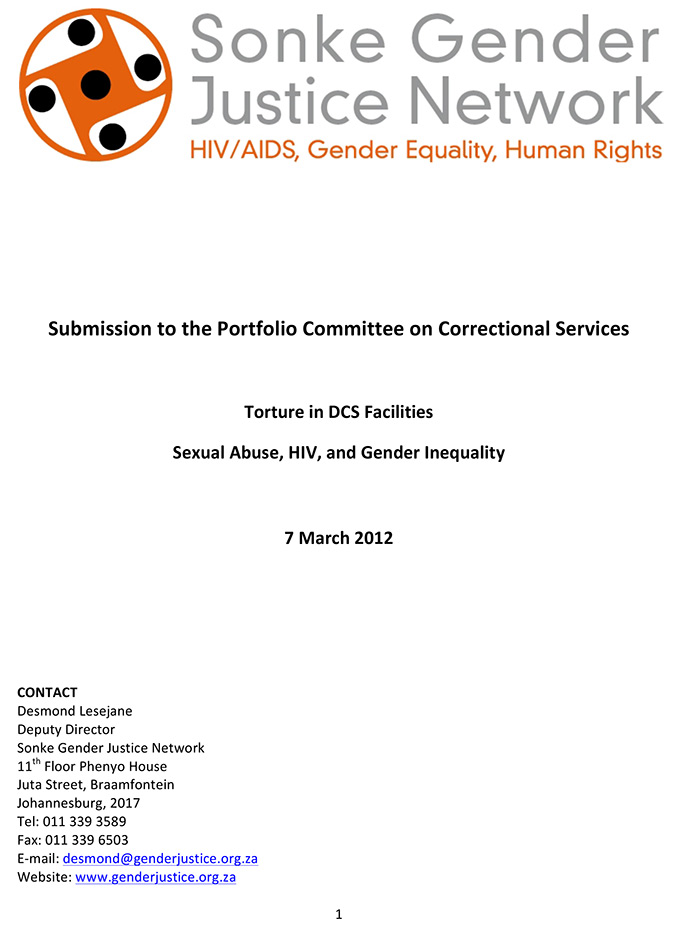
Submission to the Portfolio Committee on Correctional Services
Sonke has worked closely with DCS since 2007, conducting peer education for offenders and members in facilities in the Western Cape and Gauteng. Using our One Man Can and Brothers for Life curricula, the peer education focuses on improving the health-seeking behaviors of inmates and members, and trains participants to act as leaders within their correctional community, providing support, education, and an example of healthy living to their counterparts. It is Sonke’s view that rigid gender norms and negative masculinities contribute to the issues of gender-based violence and spread of HIV in communities inside and outside of correctional centres. Thus, in addition to providing information on sexually transmitted infections and HIV, we also train offenders and members about the unequal gender dynamics that contribute to the spread of HIV, prevent men from accessing health services, and leads them towards violence – both between men and against women and children. Sonke now works in partnership with Just Detention International (JDI) and Johns Hopkins Health and Education for South Africa, among other organisations, and seeks to promote a policy environment that addresses the issues of sexual violence and HIV in DCS centres.
-
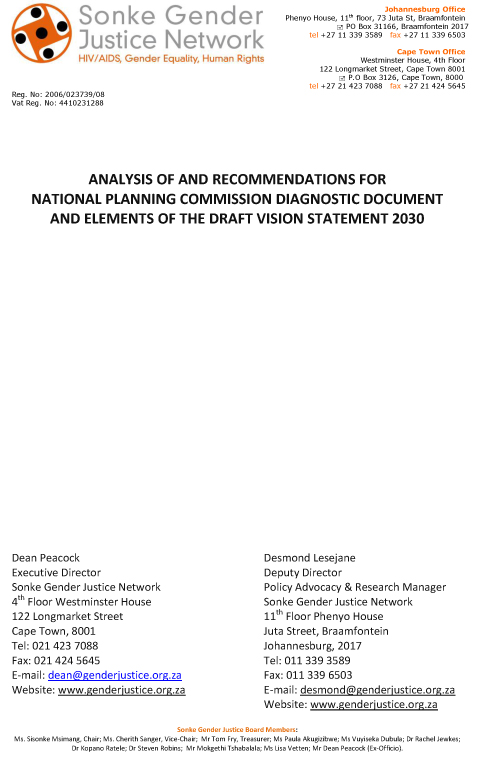
Analysis of and Recommendations for National Planning Commission Diagnostic Document and Elements of the Draft Vision Statement 2030
The National Planning Commission Diagnostic document (‘the diagnostic’), is an important step in planning for the continued development and success of South Africa as a nation. It highlights key fissures in South African society, as well as impediments to the well-being of the nation’s health, unification, economy and material resources. Thus, it serves as a critical 20-year vision document to help chart the path forward for South Africa to the year 2030.
The purpose of Sonke analysis of the diagnostic is to assess whether it adequately accounts for the key issues of gender inequality with a specific focus on HIV and AIDS, gender based violence and interpersonal violence all of which must be addressed to ensure a healthy, equitable and secure South Africa. Since one of Sonke’s primary foci is to increase government and civil society capacity to involve men and boys in preventing gender based violence, reducing the spread and impact of HIV and AIDS and promoting gender equality, Sonke’s analysis pays particular attention to whether the diagnostic includes a focus on men’s roles and responsibilities in achieving gender transformation.
-
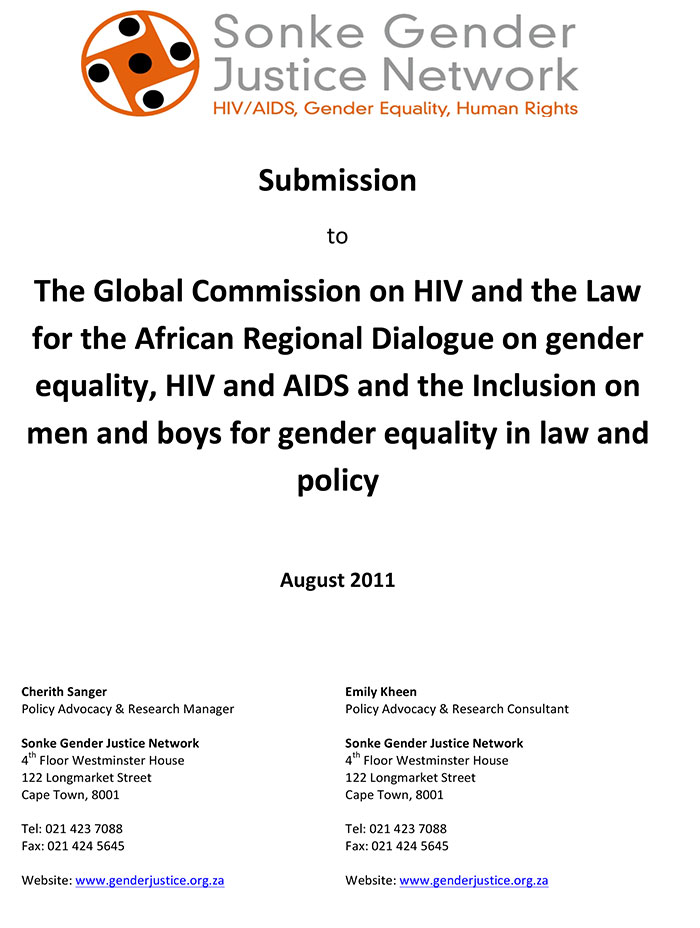
Submission to The Global Commission on HIV and the Law for the African Regional Dialogue on gender equality, HIV and AIDS and the Inclusion on men and boys for gender equality in law and policy
This submission will focus on the integration of work with men and boys in local and regional policy relating to HIV and AIDS and sexual violence and will also specifically deal with the issues of compulsory HIV testing and access to PEP in terms of sexual offences legislation in South Africa.
-
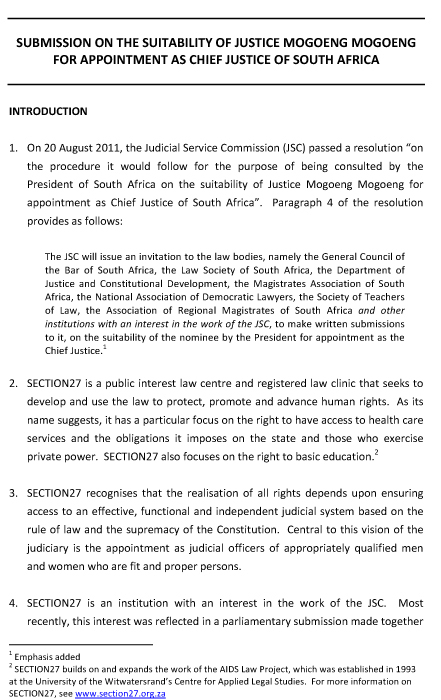
Submission on the Suitability of Justice Mogoeng Mogoeng for Appointment as Chief Justice of South Africa
SECTION27 made this submission on behalf of Sonke Gender Justice, The Equality Project and the Treatment Action Campaign on the suitability of Justice Mogoeng as Chief Justice of South Africa. The submission begins by setting out why organisations represented by SECTION27 have an interest in making submissions on the suitability of Justice Mogoeng for appointment of Chief Justice. Thereafter they consider the positions adopted by Justice Mogoeng in the superior court decisions under the following two headings: Justice Mogoeng’s approach to sexual orientation and Justice Mogoeng’s approach to gender-based violence.
-
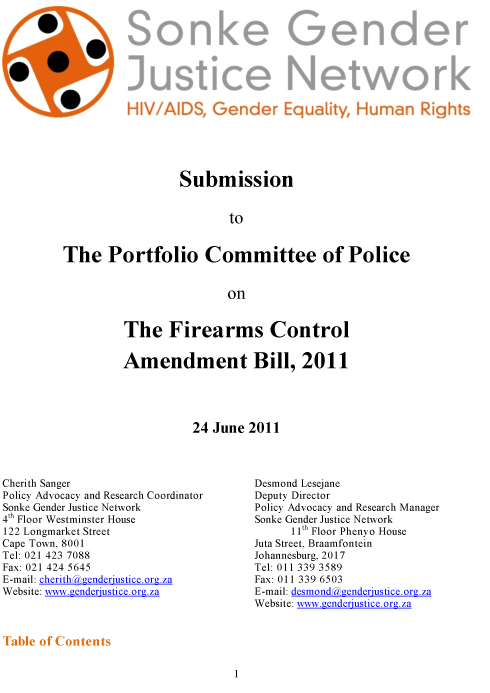
Submission to The Portfolio Committee of Police on The Firearms Control Amendment Bill
Sonke believes that firearm control laws should attempt to delink notions of manhood with firearm ownership, and promote norms that do not make firearm possession a sign of power and masculinity.
Accordingly, this submission will focus on the following points:
- Limiting the number of licences that are possible for occasional sport shooting and occasional hunting.
- Creating stricter regulations for approval of firearms as collector’s items and limiting the number of licences private collectors can obtain.
- Instituting compulsory training for firearm licence applicants, the Designated Firearms Officer, and the Appeals Board that incorporates gender specific messages that make clear the costs of owning firearms, specifically in terms of the societal costs of firearm use and abuse in the South African context as it links to interpersonal violence, domestic violence, and increased vulnerability to being a victim of violence.
- Protecting the objective decision-making of the Designated Firearms Officers by ensuring their independence from the stations at which they are located.
- Aligning the Bill with the spirit and requirements of the Domestic Violence Act 116 of 1998 (“the DVA”) by (a) requiring any person who has a final protection order issued against him or her to be declared unfit to possess a firearm and (b) removing the possibility of any person against whom a final protection order has been issued from re-applying for a competency certificate, licence, authorisation or permit after a period of 5 years from the date of the decision declaring such person unfit.
